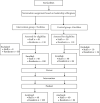Impact of Empowering Leadership Training Through Flipped Learning Approach on the Well-Being of Nursing Staff and Residents in Long-Term Care Settings
- PMID: 40761341
- PMCID: PMC12321434
- DOI: 10.1155/jonm/5815383
Impact of Empowering Leadership Training Through Flipped Learning Approach on the Well-Being of Nursing Staff and Residents in Long-Term Care Settings
Abstract
Objectives: The benefits of empowering leadership have been documented, but few studies have examined its impacts on nursing staff job well-being and resident outcomes in long-term care (LTC) settings. In this study, we evaluated the effects of an empowering leadership training program, delivered via a flipped learning approach for LTC leaders, on nursing staff and resident well-being. Design: A quasiexperimental pre-post design with a control group was used. Setting and Participants: Participants were recruited from six residential facilities in central Taiwan, and included 80 staff (40 per group), 186 residents (intervention: 100; control: 86), and 21 leaders (10 in the intervention group and 11 in the control group). Intervention: A 12-module intervention for LTC leaders comprised e-learning, face-to-face classes, and post-class assignments focused on empowering leadership. Each module lasted 2 h per week. The control group received an educational brochure covering the same topics. Methods: Postintervention data were collected 3 months after the intervention. Staff measures included the Leader Empowerment Behavior Scale, Occupational Burnout Inventory Scale, Spreitzer's Empowerment Scale, Minnesota Job Satisfaction Questionnaire, and a single-item about job stress. Resident measures were the SF-36 health survey, WHO Quality of Life Questionnaire, and Customer Satisfaction Scale. Linear mixed models were employed to assess intervention effects. This study complied with the TREND checklist. Results: Compared to controls, the intervention group demonstrated significant improvements over time in staff perceptions of empowering leader behaviors (p < 0.001), psychological empowerment (p < 0.001), job satisfaction (p < 0.001), and reduced burnout (p < 0.001). For residents, significant improvements in psychological health (p < 0.05), quality of life (p < 0.05), and care quality (p < 0.001) were detected in the intervention group. Conclusions and Implications: The empowering leadership educational intervention for leaders using a flipped learning approach enhanced nursing staff job well-being and resident health outcomes in LTC settings. This intervention can provide a sustainable model for cultivating empowering leadership to optimize LTC workforce stability and resident care. Further research exploring mechanisms and long-term sustainability is warranted.
Keywords: empowering leadership training; flipped learning approach; leader; long-term care; nursing staff; resident; well-being.
Copyright © 2025 Tzu-Pei Yeh et al. Journal of Nursing Management published by John Wiley & Sons Ltd.
Conflict of interest statement
The authors declare no conflicts of interest.
References
-
- Perruchoud E., Weissbrodt R., Verloo H., et al. The Impact of Nursing Staffs’ Working Conditions on the Quality of Care Received by Older Adults in Long-Term Residential Care Facilities: A Systematic Review of Interventional and Observational Studies. Geriatrics . 2021;7(1):p. 6. doi: 10.3390/geriatrics7010006. - DOI - PMC - PubMed
MeSH terms
LinkOut - more resources
Full Text Sources


